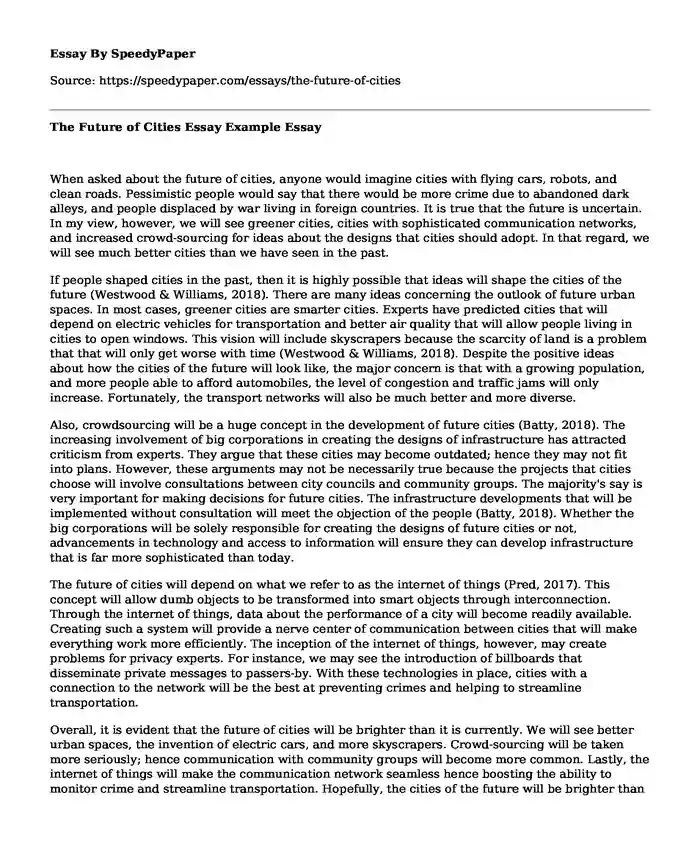When asked about the future of cities, anyone would imagine cities with flying cars, robots, and clean roads. Pessimistic people would say that there would be more crime due to abandoned dark alleys, and people displaced by war living in foreign countries. It is true that the future is uncertain. In my view, however, we will see greener cities, cities with sophisticated communication networks, and increased crowd-sourcing for ideas about the designs that cities should adopt. In that regard, we will see much better cities than we have seen in the past.
If people shaped cities in the past, then it is highly possible that ideas will shape the cities of the future (Westwood & Williams, 2018). There are many ideas concerning the outlook of future urban spaces. In most cases, greener cities are smarter cities. Experts have predicted cities that will depend on electric vehicles for transportation and better air quality that will allow people living in cities to open windows. This vision will include skyscrapers because the scarcity of land is a problem that that will only get worse with time (Westwood & Williams, 2018). Despite the positive ideas about how the cities of the future will look like, the major concern is that with a growing population, and more people able to afford automobiles, the level of congestion and traffic jams will only increase. Fortunately, the transport networks will also be much better and more diverse.
Also, crowdsourcing will be a huge concept in the development of future cities (Batty, 2018). The increasing involvement of big corporations in creating the designs of infrastructure has attracted criticism from experts. They argue that these cities may become outdated; hence they may not fit into plans. However, these arguments may not be necessarily true because the projects that cities choose will involve consultations between city councils and community groups. The majority's say is very important for making decisions for future cities. The infrastructure developments that will be implemented without consultation will meet the objection of the people (Batty, 2018). Whether the big corporations will be solely responsible for creating the designs of future cities or not, advancements in technology and access to information will ensure they can develop infrastructure that is far more sophisticated than today.
The future of cities will depend on what we refer to as the internet of things (Pred, 2017). This concept will allow dumb objects to be transformed into smart objects through interconnection. Through the internet of things, data about the performance of a city will become readily available. Creating such a system will provide a nerve center of communication between cities that will make everything work more efficiently. The inception of the internet of things, however, may create problems for privacy experts. For instance, we may see the introduction of billboards that disseminate private messages to passers-by. With these technologies in place, cities with a connection to the network will be the best at preventing crimes and helping to streamline transportation.
Overall, it is evident that the future of cities will be brighter than it is currently. We will see better urban spaces, the invention of electric cars, and more skyscrapers. Crowd-sourcing will be taken more seriously; hence communication with community groups will become more common. Lastly, the internet of things will make the communication network seamless hence boosting the ability to monitor crime and streamline transportation. Hopefully, the cities of the future will be brighter than what they are today.
References
Batty, M. (2018). Inventing Future Cities. MIT Press.
Pred, A. (2017). City-systems in advanced economies: past growth, present processes, and future development options. Routledge.
Westwood, S., & Williams, J. M. (2018). Imagining cities. Routledge.
Cite this page
The Future of Cities Essay Example. (2022, Nov 10). Retrieved from https://speedypaper.com/essays/the-future-of-cities
Request Removal
If you are the original author of this essay and no longer wish to have it published on the SpeedyPaper website, please click below to request its removal:
- Free Essay with Nursing Case Studies
- Literary Essay Example: Sigurd the Volsung Research
- Free Essay: Breaking the Barriers and Comprehension for Middle Schools
- Free Essay: Social Media and Eating Disorders
- Is Healthcare a Right? The Answer Is in Our Free Essay
- Essay Example: The Iroquois Creation Story
- Essay Sample on Homeland Security: Response and Recovery
Popular categories





